【VIP专享】ACE昂立小升初(B)
- 格式:pdf
- 大小:354.51 KB
- 文档页数:31
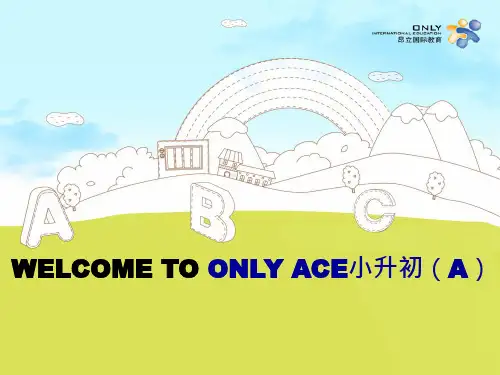

UNIT 11.Listen and circle 听音,圈出听到的内容。
1. A.F B.L C.M D.N2. A.BD B.DB C.PB D.DP3. A.HJK B.KHJ C.HKL D.JHK4. A.UQW B.QUW C.UWQ D.QWU5. A.SXF B.XFS C.FSX D.SFX6. A. g p q B. p q g C. p g q D. q pg7. A. pea B. tea C. bee D. sea8. A. bee B.T C. pea D.C2.Listen and fill in the blanks 听音,按字母表顺序写出所听到的字母的后一个字母。
1.____ 2.____ 3.____ 4.____5.____6.____3.Write down the vowels 写出五个元音字母的大小写。
_________________________________________________________________________________________________________________________________________________________________________________________________________4.Fill in the blanks 按字母表顺序,写出所给的字母的左右邻居。
1._______u_______2._______F_______3._______q_______4._______X_______5._______e________6._______H_______5.Read and order 根据小写字母的顺序,排列大写字母的顺序。
6.Fill in the blanks 给所给字母添一笔或减一笔,改成另一个字母。
1.c__________2.O__________3.E___________4.V___________7.Read and judge 判断所给字母是否含有共同的音素,正确的用T表示,错误的用F表示。
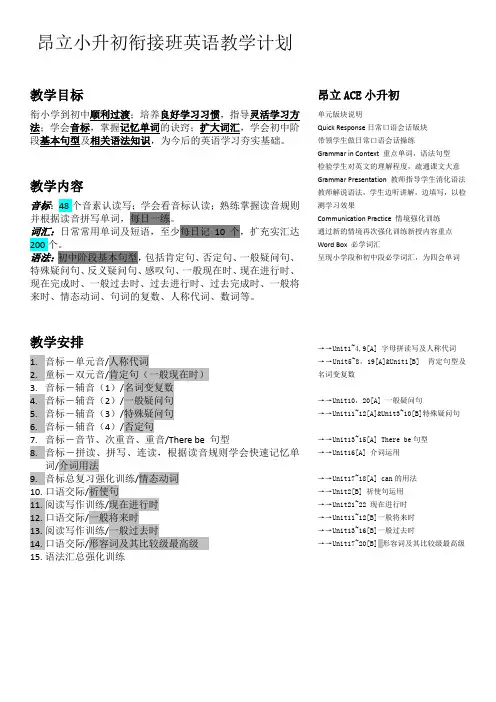
昂立小升初衔接班英语教学计划教学目标衔小学到初中顺利过渡;培养良好学习习惯,指导灵活学习方法;学会音标,掌握记忆单词的诀窍;扩大词汇,学会初中阶段基本句型及相关语法知识,为今后的英语学习夯实基础。
教学内容音标:48个音素认读写;学会看音标认读;熟练掌握读音规则并根据读音拼写单词,每日一练。
词汇:日常常用单词及短语,至少每日记10个,扩充实汇达200个。
语法:初中阶段基本句型,包括肯定句、否定句、一般疑问句、特殊疑问句、反义疑问句、感叹句、一般现在时、现在进行时、现在完成时、一般过去时、过去进行时、过去完成时、一般将来时、情态动词、句词的复数、人称代词、数词等。
教学安排1.音标-单元音/人称代词2.童标-双元音/肯定句(一般现在时)3.音标-辅音(1)/名词变复数4.音标-辅音(2)/一般疑问句5.音标-辅音(3)/特殊疑问句6.音标-辅音(4)/否定句7.音标-音节、次重音、重音/There be 句型8.音标-拼读、拼写、连读,根据读音规则学会快速记忆单词/介词用法9.音标总复习强化训练/情态动词10.口语交际/祈使句11.阅读写作训练/现在进行时12.口语交际/一般将来时13.阅读写作训练/一般过去时14.口语交际/形容词及其比较级最高级15.语法汇总强化训练昂立ACE小升初单元版块说明Quick Response日常口语会话版块带领学生做日常口语会话操练Grammar in Context 重点单词,语法句型检验学生对英文的理解程度,疏通课文大意Grammar Presentation 教师指导学生消化语法教师解说语法,学生边听讲解,边填写,以检测学习效果Communication Practice 情境强化训练通过新的情境再次强化训练新授内容重点Word Box 必学词汇呈现小学段和初中段必学词汇,为四会单词→→Unit1~4,9[A] 字母拼读写及人称代词→→Unit5~8,19[A]&Unit1[B] 肯定句型及名词变复数→→Unit10,20[A] 一般疑问句→→Unit11~12[A]&Unit3~10[B]特殊疑问句→→Unit13~15[A] There be句型→→Unit16[A] 介词运用→→Unit17~18[A] can的用法→→Unit2[B] 祈使句运用→→Unit21~22 现在进行时→→Unit11~12[B]一般将来时→→Unit13~16[B]一般过去时→→Unit17~20[B]形容词及其比较级最高级。
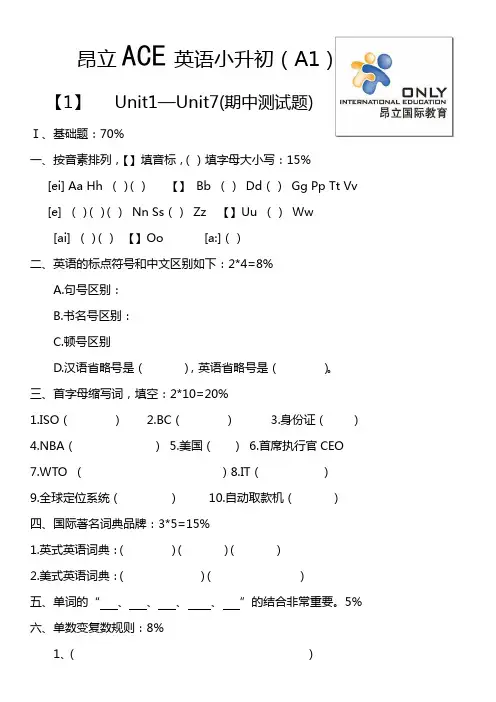
昂立ACE英语小升初(A1)【1】Unit1—Unit7(期中测试题)Ⅰ、基础题:70%一、按音素排列,【】填音标,()填字母大小写:15%[ei] Aa Hh ()()【】Bb ()Dd()Gg Pp Tt Vv[e] ()()()Nn Ss()Zz 【】Uu ()Ww[ai] ()()【】Oo [a:]()二、英语的标点符号和中文区别如下:2*4=8%A.句号区别:B.书名号区别:C.顿号区别D.汉语省略号是(),英语省略号是()。
三、首字母缩写词,填空:2*10=20%1.ISO()2.BC()3.身份证()4.NBA()5.美国()6.首席执行官CEO7.WTO ()8.IT()9.全球定位系统()10.自动取款机()四、国际著名词典品牌:3*5=15%1.英式英语词典:()()()2.美式英语词典:()()五、单词的“、、、、”的结合非常重要。
5%六、单数变复数规则:8%1、()2()结尾,在词尾加es。
3、f,fe结尾,把f,fe改成()加()。
4、辅音字母加y结尾,把()改成()加()。
5、o结尾,()的加es,()的加s。
Ⅱ、提高题:30%一、阅读理解:20%Why Are You So Sad?Mrs Green : Why are you so sad?Mrs Brown: Because I lost my cat last week.Mrs Green: I’m so sorry. But why don’t you write something on the paper and send it to the newspaper that you want it back?Mrs Brown: Don’t be so silly. She is a Japanese cat and she can’t read English newspaper. 选择填空:1. Sad means . A: happy B: glad C: nice D: unhappy2. lost a cat . A: Mrs Brown B: Mr Brown C: Mrs Green D: Mr Green3. Mrs Green asks Mrs Brown to wrote something to the .A:Mrs Brown B: Mrs Green C: cat D: newspaper4. is silly. A: Mrs Brown B: Mr Brown C: Mrs Green D: Mr Green5. “She”in the last sentence means .A: Mrs Green B: Mrs Brown C: cat D: nobody二、完成表格:10%英语中文人称第三she 她it 第三。
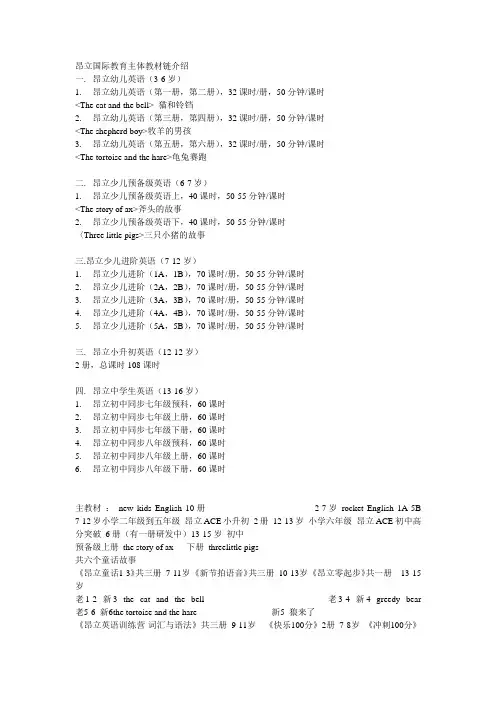
昂立国际教育主体教材链介绍一. 昂立幼儿英语(3-6岁)1. 昂立幼儿英语(第一册,第二册),32课时/册,50分钟/课时<The cat and the bell> 猫和铃铛2. 昂立幼儿英语(第三册,第四册),32课时/册,50分钟/课时<The shepherd boy>牧羊的男孩3. 昂立幼儿英语(第五册,第六册),32课时/册,50分钟/课时<The tortoise and the hare>龟兔赛跑二. 昂立少儿预备级英语(6-7岁)1. 昂立少儿预备级英语上,40课时,50-55分钟/课时<The story of ax>斧头的故事2. 昂立少儿预备级英语下,40课时,50-55分钟/课时〈Three little pigs>三只小猪的故事三.昂立少儿进阶英语(7-12岁)1. 昂立少儿进阶(1A,1B),70课时/册,50-55分钟/课时2. 昂立少儿进阶(2A,2B),70课时/册,50-55分钟/课时3. 昂立少儿进阶(3A,3B),70课时/册,50-55分钟/课时4. 昂立少儿进阶(4A,4B),70课时/册,50-55分钟/课时5. 昂立少儿进阶(5A,5B),70课时/册,50-55分钟/课时三. 昂立小升初英语(12-12岁)2册,总课时108课时四. 昂立中学生英语(13-16岁)1. 昂立初中同步七年级预科,60课时2. 昂立初中同步七年级上册,60课时3. 昂立初中同步七年级下册,60课时4. 昂立初中同步八年级预科,60课时5. 昂立初中同步八年级上册,60课时6. 昂立初中同步八年级下册,60课时主教材:new kids English 10册2-7岁rocket English 1A-5B 7-12岁小学二年级到五年级昂立ACE小升初2册12-13岁小学六年级昂立ACE初中高分突破6册(有一册研发中)13-15岁初中预备级上册the story of ax 下册threelittle pigs共六个童话故事《昂立童话1-3》共三册7-11岁《新节拍语音》共三册10-13岁《昂立零起步》共一册13-15岁老1-2 新3 the cat and the bell 老3-4 新4 greedy bear 老5-6 新6the tortoise and the hare 新5 狼来了《昂立英语训练营-词汇与语法》共三册9-11岁《快乐100分》2册7-8岁《冲刺100分》共6册9-11岁《昂立童话》《快乐一百分》2册7-8岁《冲刺一百分》6册9-11岁。
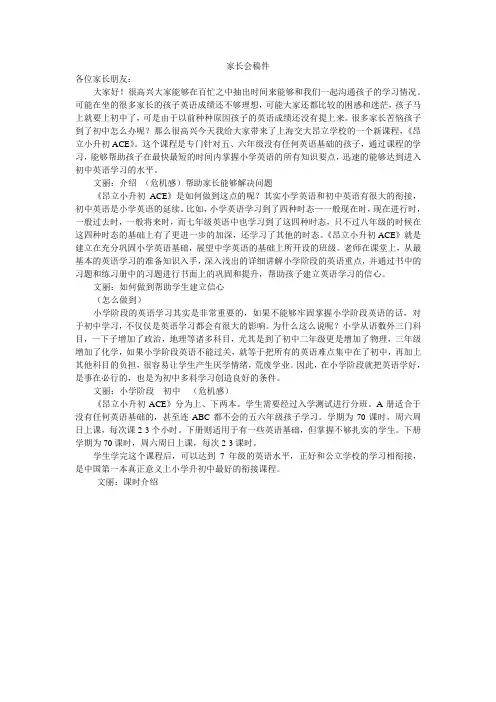
家长会稿件各位家长朋友:大家好!很高兴大家能够在百忙之中抽出时间来能够和我们一起沟通孩子的学习情况。
可能在坐的很多家长的孩子英语成绩还不够理想,可能大家还都比较的困惑和迷茫,孩子马上就要上初中了,可是由于以前种种原因孩子的英语成绩还没有提上来。
很多家长苦恼孩子到了初中怎么办呢?那么很高兴今天我给大家带来了上海交大昂立学校的一个新课程,《昂立小升初ACE》。
这个课程是专门针对五、六年级没有任何英语基础的孩子,通过课程的学习,能够帮助孩子在最快最短的时间内掌握小学英语的所有知识要点,迅速的能够达到进入初中英语学习的水平。
文丽:介绍(危机感)帮助家长能够解决问题《昂立小升初ACE》是如何做到这点的呢?其实小学英语和初中英语有很大的衔接,初中英语是小学英语的延续。
比如,小学英语学习到了四种时态—一般现在时,现在进行时,一般过去时,一般将来时,而七年级英语中也学习到了这四种时态,只不过八年级的时候在这四种时态的基础上有了更进一步的加深,还学习了其他的时态。
《昂立小升初ACE》就是建立在充分巩固小学英语基础,展望中学英语的基础上所开设的班级。
老师在课堂上,从最基本的英语学习的准备知识入手,深入浅出的详细讲解小学阶段的英语重点,并通过书中的习题和练习册中的习题进行书面上的巩固和提升,帮助孩子建立英语学习的信心。
文丽:如何做到帮助学生建立信心(怎么做到)小学阶段的英语学习其实是非常重要的,如果不能够牢固掌握小学阶段英语的话,对于初中学习,不仅仅是英语学习都会有很大的影响。
为什么这么说呢?小学从语数外三门科目,一下子增加了政治,地理等诸多科目,尤其是到了初中二年级更是增加了物理,三年级增加了化学,如果小学阶段英语不能过关,就等于把所有的英语难点集中在了初中,再加上其他科目的负担,很容易让学生产生厌学情绪,荒废学业。
因此,在小学阶段就把英语学好,是事在必行的,也是为初中多科学习创造良好的条件。
文丽:小学阶段---初中(危机感)《昂立小升初ACE》分为上、下两本。
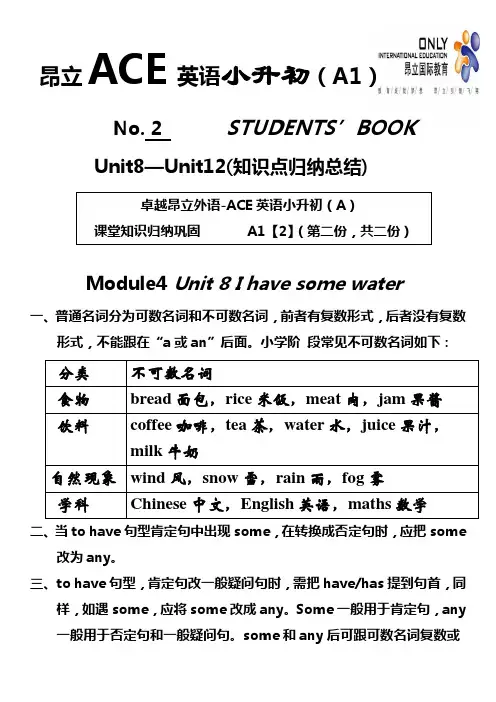
昂立ACE英语小升初(A1)No. 2 STUDENTS’BOOKUnit8—Unit12(知识点归纳总结)卓越昂立外语-ACE英语小升初(A)课堂知识归纳巩固A1【2】(第二份,共二份)Module4 Unit 8 I have some water一、普通名词分为可数名词和不可数名词,前者有复数形式,后者没有复数形式,不能跟在“a或an”后面。
小学阶段常见不可数名词如下:分类不可数名词食物bread面包,rice米饭,meat肉,jam果酱饮料coffee咖啡,tea茶,water水,juice果汁,milk牛奶自然现象wind风,snow雪,rain雨,fog雾学科Chinese中文,English英语,maths数学二、当to have句型肯定句中出现some,在转换成否定句时,应把some改为any。
三、to have句型,肯定句改一般疑问句时,需把have/has提到句首,同样,如遇some,应将some改成any。
Some一般用于肯定句,any 一般用于否定句和一般疑问句。
some和any后可跟可数名词复数或不可数名词。
在一般疑问句的简略回答中,勿忘用人称代词主格。
Module5 Unit 9 My name is Lucy一、物主代词也叫做人称代词所有格,表示归属关系。
物主代词共有两种,本单元重点教学形容词性物主代词。
人称单数复数主格所有格主格所有格第一人称I my 我的we our 我们的第二人称you your你的you your你们的第三人称he his 他的they their他们的she her 她的it its 它的形容词性物主代词的用法:1、形容词性物主代词必须放在名词前,不能脱离名词单独使用。
2、他不能决定名词的单复数。
3、和指示代词一样,对名词起到特指作用。
4、任何所有格和名词组成的结构都是第三人称。
5、形容词性物主代词加名词,可以用第三人称代词替换。
二、形容词性物主代词加名词,可以用第三人称代词替换。
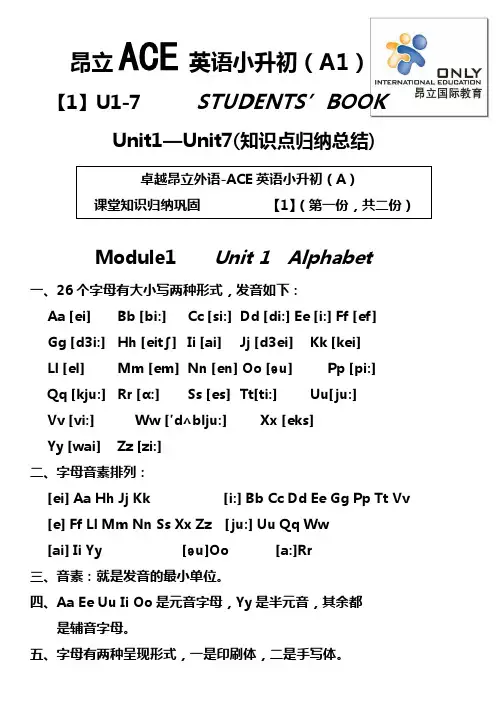
昂立ACE 英语小升初(A1)【1】U1-7 STUDENTS ’BOOKUnit1—Unit7(知识点归纳总结)Module1 Unit 1 Alphabet一、26个字母有大小写两种形式,发音如下:Aa [ei] Bb [bi:] Cc [si:] Dd [di:] Ee [i:] Ff [ef]Gg [d3i:] Hh [eit ∫] Ii [ai]Jj [d3ei] Kk [kei] Ll [el] Mm [em] N n [en] Oo [əu]Pp [pi:] Qq [kju:] Rr [ɑ:]Ss [es] Tt[ti:] Uu[ju:] Vv [vi:] Ww [′d ∧blju:] Xx [eks]Yy [wai] Zz [zi:]二、字母音素排列:[ei] Aa Hh Jj Kk [i:] Bb Cc Dd Ee Gg Pp Tt Vv[e] Ff Ll Mm Nn Ss Xx Zz [ju:] Uu Qq Ww[ai] Ii Yy [əu]Oo [a:]Rr三、音素:就是发音的最小单位。
四、Aa Ee Uu Ii Oo 是元音字母,Yy 是半元音,其余都是辅音字母。
五、字母有两种呈现形式,一是印刷体,二是手写体。
卓越昂立外语-ACE 英语小升初(A ) 课堂知识归纳巩固 【1】(第一份,共二份)六、我们目前需要掌握的书写体,称作“意大利体”,俗称“手书写体。
”七、第一线第三根线有点与众不同,又称作第一格第二线“基线”。
所有字母的全部或主体部第二格第三线分都应落在基线上。
第三格第四线八、1)大写字母一样高,顶第一线,小写字母主体在第二格,不出格。
上端顶第一线,下端顶第四线。
2)字母和字母不能挤得过紧,单词和单词之间应保持小写字母a的宽度为宜。
3)英语的标点符号和中文的大致相同,主要区别如下:A.汉语句号是空心圆,英语句号是一个实心圆点。
B.汉语有书名号,英语没有书名号。
C.汉语有顿号,英语没有顿号。
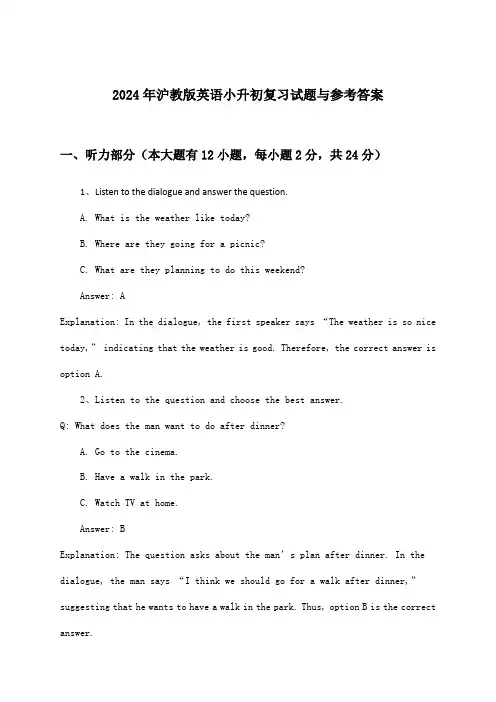
2024年沪教版英语小升初复习试题与参考答案一、听力部分(本大题有12小题,每小题2分,共24分)1、Listen to the dialogue and answer the question.A. What is the weather like today?B. Where are they going for a picnic?C. What are they planning to do this weekend?Answer: AExplanation: In the dialogue, the first speaker says “The weather is so nice today,” indicating that the weather is good. Therefore, the correct answer is option A.2、Listen to the question and choose the best answer.Q: What does the man want to do after dinner?A. Go to the cinema.B. Have a walk in the park.C. Watch TV at home.Answer: BExplanation: The question asks about the man’s plan after dinner. In the dialogue, the man says “I think we should go for a walk after dinner,” suggesting that he wants to have a walk in the park. Thus, option B is the correct answer.3.You are listening to a conversation between a student and a teacher. Student: Mr. Smith, can you explain to me how to use the present perfect tense?Teacher: Sure, the present perfect tense is used to talk about actions that started in the past and continue to the present, or actions that have a present result. It’s formed with the auxiliary verb “have” or “has” followed by the past participle of the main verb.Student: Oh, I see. So, “I have studied English for five years” means I started studying English five years ago and I am still studying it now?Teacher: Exactly. Great job!Question: What is the present perfect tense used for according to the conversation?A) To describe an action that happened in the past.B) To talk about an action that started in the past and continues to the present.C) To express an action that will happen in the future.D) To show a present state or condition.Answer: B) To talk about an action that started in the past and continues to the present.Explanation: The teacher explains that the present perfect tense is used for actions that started in the past and continue to the present or have a present result, which aligns with option B.4.Listen to a short dialogue between two friends, Alex and Sarah. Alex: Hey Sarah, have you ever been to the Great Wall of China?Sarah: Yes, I have. It was such an amazing experience! I went there last summer.Alex: That’s great! How was the trip?Sarah: It was really tiring, but worth it. The wall is so long and there are so many people visiting it.Alex: I heard that it’s one of the wonders of the world. I can’t wait to visit it myself.Sarah: You should definitely go. It’s a must-see place.Question: What is the topic of the dialogue?A) A book Alex wants to read.B) A place Alex wants to visit.C) A movie Sarah recently watched.D) A recent vacation Sarah took.Answer: D) A recent vacation Sarah took.Explanation: In the dialogue, Alex asks Sarah if she has ever been to the Great Wall of China, and Sarah talks about her experience of visiting it last summer. This indicates that the topic is about a recent vacation Sarah took.5.Listen to the conversation and answer the question.W: Hi, John. How was your science project last week?M: It was great! I presented it to my class and everyone seemed really interested.Q: What subject was John’s project about?A. ScienceB. MathC. EnglishD. HistoryAnswer: A. ScienceExplanation: John mentioned that he presented his science project to his class, which indicates that the subject was science.6.Listen to the dialogue and complete the sentence with the correct word. W: How do you like the new school, Tom?M: I’m okay, but I really miss my old friends from elementary school.W: I understand. It’s always hard to make new friends.Q: What does Tom miss about his old school?A. The teachersB. The booksC. His friendsD. The playgroundAnswer: C. His friendsExplanation: Tom explicitly states that he misses his old friends from elementary school, indicating that the correct answer is “his friends.”7、Listen to the dialogue and answer the question.W: Hi, John. How was your science project yesterday?M: It was great! We presented our findings to the class, and everyone seemedreally interested.Q: What did John and his classmates do yesterday?A. They had a science test.B. They presented their science project.C. They discussed their science homework.D. They visited a science museum.Answer: BExplanation: The dialogue indicates that John and his classmates “presented their findings to the class,” which means they presented their science project.8、Listen to the conversation and choose the correct answer.M: Did you hear about the new pizza place downtown? They have a special promotion.W: Yes, I did. But I’m not sure if I should try it. What’s the special promotion?M: They’re offering a free slice with every pizza purchase!Q: What is the special promotion at the new pizza place?A. A discount on large pizzas.B. A free slice of pizza with every purchase.C. Buy one get one free for all pizzas.D. A 10% off coupon for students.Answer: BExplanation: The conversation states that “They’re offering a free slice withevery pizza purch ase,” which directly answers the question about the special promotion.9.You are listening to a conversation between a student and a teacher.Student: “Teacher, can you explain what ‘vocabulary’ means?”Teacher: “Certainly! Vocabulary refers to the set of words that a person knows and uses. It’s important for language learning because it helps you to express your thoughts and ideas more clearly.”Question: What is the teacher explaining in the conversation?A. The importance of grammar in language learning.B. The meaning of the word ‘vocabulary’.C. How to improve listening skills.D. The difference between English and Chinese.Answer: B. The meaning of the word ‘vocabulary’.Explanation: The teacher is explaining what ‘vocabulary’ means in the conversation.10.You are listening to a dialogue between two friends discussing their weekend plans.Friend 1: “Hey, do you have any plans for this weekend?”Friend 2: “Yes, I’m planning to go hiking with my family. How about you?”Friend 1: “I thought about going to the beach, but I’m not sure if it will be sunny.”Question: What are the two friends talking about?A. Their favorite movies.B. Their weekend plans.C. Their favorite sports.D. Their daily routines.Answer: B. Their weekend plans.Explanation: The conversation is focused on their plans for the weekend.11.You are listening to a conversation between two friends, Alex and Bob. They are discussing their weekend plans.Alex: Hi Bob, what are you planning to do this weekend?Bob: Hi Alex, I’m thinking of going hiking with my family. How about you? Alex: That sounds great! I’m planning to visit the local museum. I’ve heard it has an amazing collection of art.Bob: Wow, that’s impressive! I’ve never been to a museum before. Maybe we can go together next time.Question: What is Alex planning to do this weekend?A. Go hikingB. Visit the local museumC. Have a picnicAnswer: BExplanation: In the conversation, Alex mentions that he is planning to visit the local museum, which is option B.12.You are listening to a phone conversation between a teacher and a student.Teacher: Hi Sarah, how are you doing with your schoolwork?Sarah: Hi Mrs. Johnson, I’m doing okay, but I’m having a hard time understanding some of the math problems.Teacher: I understand, Sarah. Let’s go over them together. Can you come to my office after school?Sarah: Sure, that works for me. Thank you, Mrs. Johnson.Question: What is the teacher planning to do with Sarah?A. Give her a math testB. Go over her math problems togetherC. Assign her extra homeworkAnswer: BExplanation: In the conversation, the teacher offers to go over Sarah’s math problems together, which is option B.二、选择题(本大题有12小题,每小题2分,共24分)1、What is the correct way to spell the word “school” in English?A. schcoolB. schcoolC. schooolD. sch00lAnswer: BExplanation: The correct spelling of the word “school” in English is “school.”The letter “o” is repeated in the word, which is why options A, C, and D are incorrect.2、 Which of the following sentences is grammatically correct?A. She don’t like apples.B. He are playing football now.C. They is going to the park.D. We are go to the movies tonight.Answer: DExplanation: The correct sentence is “We are going to the movies tonight.” Options A, B, and C c ontain grammatical errors. “Don’t” should be “doesn’t” in option A, “are” should be “is” in option B, and “is” should be “are”in option C.3.Choose the correct word to complete the sentence:The cat___________jumped over the fence.A. wasB. isC. beD. willAnswer: A.Explanation: The correct option is “was” because the sentence describes a past action, and the past continuous tense is used to describe an action that was happening at a specific moment in the past.4.Select the sentence that follows proper subject-verb agreement:A. The boys and girls are happy.B. The boy and girl is happy.C. Both boys and girls is happy.D. Both the boys and girls are happy.Answer: D.Explanation: The correct option is “Both the boys and girls are happy.” When using “both…and,” both parts of the phrase must agree in number with the verb. Since “boys” and “girls” are plural, the correct verb form is also plural.5.Choose the correct word to complete the sentence:The cat is sitting under the tree,_______its tail lazily.A)wavingB)wigglingC)twitchingD)tremblingAnswer: B) wigglingExplanation: The phrase “waving its tail lazily” implies that the cat is moving its tail in a relaxed and slow motion, which is a common way cats express conten tment or relaxation. “Waving” and “twitching” could also fit, but “wiggling” is more specifically associated with the tail’s movement.6.Select the sentence that best describes the word “ultimate” from the following options:A)The ultimate goal is to achieve happiness.B)The ultimate outcome was not as expected.C)The ultimate responsibility falls on the parents.D)The ultimate solution was found after much research.Answer: A) The ultimate goal is to achieve happiness.Explanation: The word “ultimate” typically re fers to the best, most complete, or final aspect of something. In this case, option A best fits the definition as it describes the best or most complete goal. Options B and D describe the final outcome or solution, but they do not convey the fullness or pe rfection that “ultimate” implies. Option C uses “ultimate” correctly butin a different context that does not directly describe the word’s meaning.7.Choose the correct word to complete the sentence.The teacher praised the student for his_efforts in the English competition.A. goodB. greatC. hardD. bestAnswer: CExplanation: The correct answer is “hard” because the phrase “hard efforts” is commonly used to describe someone who has worked very hard. The other options do not convey the same meaning as “hard” in this context. “Good” and “great” can also be used to describe efforts, but they are more general and do not necessarily imply a lot of effort. “Best” implies the highest level of quality, but it does not necessarily mean the efforts were hard.8.Read the dialogue and choose the best response for the underlined word or phrase.A: I think you should study more for the upcoming test.B: Oh, I know. I’ve been working on my study schedule, but I’m still worried I won’t be ready.A: Maybe you should consider taking a break and relaxing a bit.B:__________A. Yes, that sounds like a good idea.B. I don’t think that will help.C. I already have a schedule, and it’s all planned out.D. I’m not sure, but I appreciate the concern.Answer: AExplanation: The correct response is “Yes, that sounds like a good idea” because it acknowledges the suggestion made by the first speaker and shows agreement. The other options either dismiss the idea (B), show that the second speaker is stubborn (C), or show uncertainty without appreciation (D).9、Which of the following sentences is correct if you want to say that your friend enjoys playing football?A. My friend like play football.B. My friend likes plays football.C. My friend likes playing football.D. My friend liking play football.*Answer: C. My friend likes playing football.*Explanation: In this sentence, we use the third-person singular form of the verb ‘like’ which is ‘likes’, and the gerund form of the verb ‘play’ which is ‘playing’. Therefore, the correct way to express the idea is “My friend likes playing football.”10、If it’s raining outside, which of the following sentences would you use to suggest staying indoors?A. Why don’t we stay inside because it rains?B. How about staying in as it is raining?C. Let’s go out although it is raining.D. We should leave since it’s raining.*Answer: B. How about staying in as it is raining?*Explanation: This is the most natural and polite way to make a suggestion based on the weather condition. “How about” is commonly used to make a proposal or an offer. The sentence structure correctly links the reason (it is raining) with the suggestion (staying in).11.What is the past tense of the verb “go”?A)goesB)wentC)goedD)goneAnswer: B) wentExplanation: The past tense of the verb “go” is “went.” “Goes” is thepresent tense, “goed” is incorrect (the correct past tense form is “went”), and “gone” is the past participle, not the past tense.12.Choose the sentence that uses the correct comparative form of the adjective “happy.”A)This book is happier than that one.B)This book is more happier than that one.C)This book is happier than that one.D)This book is happyer than that one.Answer: C) This book is happier than that one.Explanation: The comparativ e form of the adjective “happy” is “happier,” not “more happier” (which is redundant) or “happyer” (which is not the correct form). Therefore, option C is the correct choice.三、完型填空(10分)Exercise 3: Cloze TestRead the following passage and choose the best word for each blank from the options given.In ancient China, there was a famous story about a 1 man named Yu who was known for his wisdom and courage. Yu was born into a poor family and he had to work hard from a young age to 2 his family. Despite his difficult circumstances, he never gave up on his dreams of making a better life for himself and his community.One day, Yu heard about a great opportunity to help his village. The village was suffering from a severe drought, and the crops were failing. The villagers were desperate and turned to Yu, hoping that he could find a solution. Yu immediately set out to 3 the problem. He knew that he needed to find a way to bring water to the village.With great determination, Yu traveled far and wide, asking for advice from wise people and studying ancient texts. After months of hard work and research, he finally discovered a way to 4 the water from a distant river to the village. The villagers were overjoyed and thanked Yu for his incredible 5.1.A. brave B. poor C. lazy D. rich2.A. support B. ignore C. harm D. destroy3.A. ignore B. avoid C. solve D. create4.A. collect B. waste C. store D. remove5.A. education B. invention C. patience D. courageAnswers:1.B. poor2.A. support3.C. solve4.A. collect5.D. courage四、阅读理解(26分)Title: A Day in the Life of a Young InventorSara was a young inventor with a vivid imagination. She loved creating things that could make life easier for her friends and family. Every morning, Sara would wake up at 6 AM and start her day by drawing out ideas for new inventions in her notebook. This morning, she was particularly excited about designing a robot that could help with household chores.After breakfast, she went straight to her workshop, which was a small room filled with tools, parts, and half-finished projects. The walls were covered with sketches and diagrams of her inventions. Today, she planned to build a prototype of her cleaning robot. It took her all morning and part of the afternoon, but finally, she had a working model that could pick up toys from the floor and place them in the toy box.At around 4 PM, her little brother came home from school. He was amazed by what Sara had built. Together, they tested the robot, and it worked perfectly! They spent the rest of the afternoon playing with the robot and cleaning their playroom effortlessly. When dinner time arrived, Sara felt proud of what she had accomplished. Her parents praised her for her hard work and creativity. That night, before going to bed, Sara wrote in her journal about her day and started brainstorming ideas for her next invention.Questions:1.What did Sara do first thing in the morning?2.Describe the main project Sara worked on during the day.3.How did Sara feel at the end of the day?Answers:1.Sara woke up at 6 AM and started her day by drawing out ideas for new inventions in her notebook.2.Sara worked on designing and building a prototype of a cleaning robot that could pick up toys from the floor and place them in the toy box.3.At the end of the day, Sara felt proud of what she had accomplished after seeing her robot work successfully and receiving praise from her parents.五、写作题(16分)Write a short story about a day in your life. You should include the following points:1.Describe your morning routine.2.Talk about an interesting experience you had during the day.3.Share your feelings and thoughts about the day.Example:Today was an unforgettable day for me. It started with my usual morning routine. I woke up early, had a healthy breakfast, and then went to school. The first class of the day was English, and our teacher asked us to write a short story. I decided to write about my day.My morning routine was quite normal. After school, I went to the library with my friends. We were looking for books to read when I noticed a cat sittingon a bookshelf. It was so cute and I couldn’t resist taking a picture of it. My friends laughed at me, but I thought it was a fun way to spend my time.The most interesting experience of the day happened in the afternoon. We had a sports class, and our teacher organized a relay race. I was on the running team, and we were so excited to win. As I was running, I slipped on the track and fell. My friends rushed to help me up, and we all laughed about it. In the end, our team won the race, and we were so happy!As the day came to an end, I felt grateful for all the fun moments I had. It was a day filled with laughter and joy, and I will always remember it.Analysis:This example follows the structure of the writing prompt. It starts with the student’s morning routine, then describes an interesting experience during the day, and finally shares the student’s feelings about the day. The example uses vivid details and simple language to make the story engaging. The student also demonstrates good use of grammar and punctuation.。
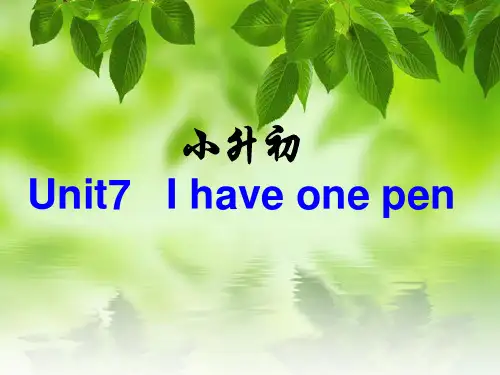
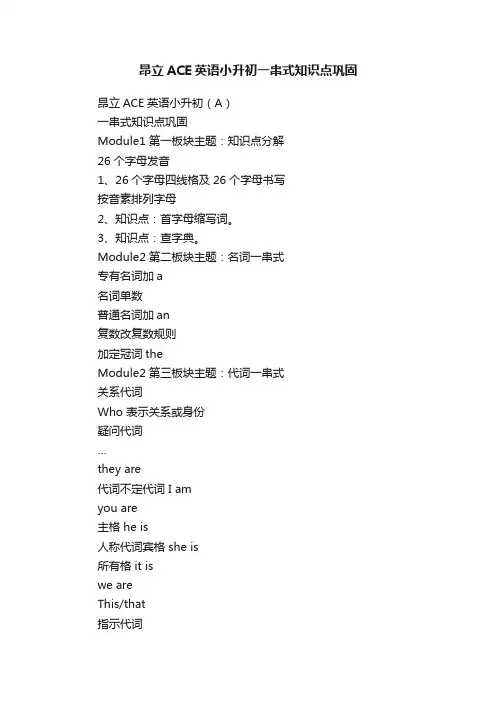
昂立ACE英语小升初一串式知识点巩固
昂立ACE英语小升初(A)
一串式知识点巩固
Module1 第一板块主题:知识点分解
26个字母发音
1、26个字母四线格及26个字母书写
按音素排列字母
2、知识点:首字母缩写词。
3、知识点:查字典。
Module2 第二板块主题:名词一串式
专有名词加a
名词单数
普通名词加an
复数改复数规则
加定冠词the
Module2 第三板块主题:代词一串式
关系代词
Who 表示关系或身份
疑问代词
…
they are
代词不定代词 I am
you are
主格 he is
人称代词宾格 she is
所有格 it is
we are
This/that
指示代词
These/those
形容词性物主代词
物主代词
名词性物主代词
Module2 第四板块主题:数词一串式13-19 在表示个位数的基数词后加teen 表示20以上的整十基数词是将表示十几的基数词词尾的teen改成ty
数词变化规律
表示几十几的基数词,由整十位数和个位数组成,用连词符号相连。
UNIT 11. Listen and choose根据听到的上句,选择合适的应答句。
1. ( ) A. Y es, I’m hungry. B. Y es, I’m thirst y. C. Y es, I’m happy.2. ( ) A. All right. B. No. C. Go .3. ( ) A. Wait. B. Go. C. Stop.4. ( ) A. It’s over there. B. It’s my home . C. I t’s big.5. ( ) A. No, I’m drinki ng milk. B. No, I’m drinki ng coffee. C. Y es, I’m drinki ng water. 2. Rewrit e the senten ces 正确抄写。
Peter don’t drinkcold water please__________________________________________________3. Read and judge辩音,用T/F表示。
1. don’t box ( )2. picture traffi c ( )3. or worker( )4. statio n wait ( )5. sing sign ( )6. crossnot ( )7. underg round know ( )4. Rewrit e the senten ces 将下列句子改成否定句。
1. Please sleepnow. __________________________________________2. Betty, eat some beef , please. ___________________________________3. Mr. White, please dance with Linda. ________________________________________4. Please paintan apple, Tom. ________________________________________________5. Smokei n this room , please, Mike. ____________________________________________ 5. Make senten ces 连词成句(每组两句,找出不同之处和原因)1. a, football, on, watche s, Sunday s, Nancy, match________________________________________________________________a, football, match, Nancy, watch, please_________________________________________________________________2. isn’t, Susan, crossi ng, now, road, the_________________________________________________________________cross, now, road, the, Susan, don’t__________________________________________________________________3. doesn’t, homewo rk, John, do, evenin g, on, Friday, his__________________________________________________________________don’t, homewo rk, John, do, evenin g, on, Friday, your__________________________________________________________________6. Choose the right answers 根据所给情景,选择合适的答案。
UNIT 11. Listen and choose 根据听到的上句,选择合适的应答句。
1. ( ) A. Yes, I’m hungry. B. Yes, I’m thirsty. C. Yes, I’m happy.2. ( ) A. All right. B. No. C. Go .3. ( ) A. Wait. B. Go. C. Stop.4. ( ) A. It’s over there. B. It’s my home . C. I t’s big.5. ( ) A. No, I’m drinking milk. B. No, I’m drinking coffee. C. Yes, I’m drinking water. 2. Rewrite the sentences 正确抄写。
Peter don’t drink cold water please__________________________________________________3. Read and judge 辩音,用T/F表示。
1. don’t box ( )2. picture traffic ( )3. or worker ( )4. station wait ( )5. sing sign ( )6. cross not ( )7. underground know ( )4. Rewrite the sentences 将下列句子改成否定句。
1. Please sleep now. __________________________________________2. Betty, eat some beef , please. ___________________________________3. Mr. White, please dance with Linda. ________________________________________4. Please paint an apple, Tom. ________________________________________________5. Smoke in this room , please, Mike. ____________________________________________ 5. Make sentences 连词成句(每组两句,找出不同之处和原因)1. a, football, on, watches, Sundays, Nancy, match________________________________________________________________a, football, match, Nancy, watch, please_________________________________________________________________2. isn’t, Susan, crossing, now, road, the_________________________________________________________________cross, now, road, the, Susan, don’t__________________________________________________________________3. doesn’t, homework, John, do, evening, on, Friday, his__________________________________________________________________don’t, homework, John, do, evening, on, Friday, your__________________________________________________________________6. Choose the right answers 根据所给情景,选择合适的答案。
昂立ACE全册单词测试Name ___________1蜜蜂_____________2豌豆____________3海洋____________4茶____________5汉语____________6英语___________7我__________8你_________9第三人称单数(3个)_____ 10教师__________ 11医生__________ 12 护士___________13学生_________ 14瘦的__________15胖的____________ 16 高的_________17 矮的________18 be动词的三种形式___ 19 我们_________20 你们________21 他们____________ 22 农民_________23 司机__________ 24 工人_____________ 25 厨师__________26 工程师_________ 27 快乐的___________ 28 悲伤的__________ 29 疲劳的________ 30是_____________ 31 不,不是________32 这,这个_______ 33那,那个__________ 34男人___________35 女人___________ 36男孩____________ 37女孩___________38彼得(男名)_____39琳达(女名)_______ 40 格林先生(姓)_______41 怀特小姐(姓)_____ 42 强壮的_______ 43 虚弱的__________44漂亮的___________45这些_________ 46 那些___________47 玻璃杯___________ 48 杯子_______ 49 碟子,盘子__________ 50 叉子______________51调羹________ 52 女士___________53 手表___________ 54 盒子________ 55 公共汽车___________56 叶子___________ 57 刀________ 58 土豆______________59 西红柿__________ 60 钢琴________61新的____________62旧的____________63 小的____________ 64大的____________65 水___________ 66果汁___________ 67 肉___________68 面包___________69米饭____________ 70果酱____________71咖啡____________72牛奶_____________ 73风___________74雪__________75雨_____________ 76雾___________77 一些__________78任何的___________ 79 热的____________80冷的___________81 我的_____________ 82 你的_____________83他的___________ 84 它的____________ 85 她的____________86我们的_________ 87 他们的___________ 88 名字____________89 连衣裙_________ 90 短裙____________ 91 夹克衫__________92 衬衫(男士)_____93 长的___________ 94 短的___________95好看的,好吃的_____ 96 好的_________ 97我的(adj)______98你的(adj)________99他的(adj)____ 100 她的(adj)____ 101它的(adj)_______ 102我们的(adj)103他们的(adj)_____104衬衫(女士)___________105帽子106鞋子_____________107红色____________108 蓝色_________ 109黑色______________110白色_____________111 谁__________ 112 什么_____________113 照片___________114家庭_________ 115父亲_____________116 母亲____________ 117 兄弟_________ 118 姐妹_____________119 叔叔,伯伯______ 120 姑姑,阿姨121 堂兄弟,表兄弟____ 122 男演员_________123女演员_______ 124谁的_____________125没有一样东西_____126苹果127梨_____________128 瓜_________ 129 柠檬____________130桃子__________131树__________132 猫_____________133 鸟____________134 花__________135 课桌____________ 136 桌子___________137 垃圾,废弃物_____ 138 箱子,容器139小径,小路________140 公园__________141美丽的________ 142 在...里_________143 在...上_______144在...下________ 145 在...旁边___________146 紧挨着_______147 在...附近_______ 148在...两者之间________149 在...后面______150 在...前面______ 151 许多___________152米奇(人名)____153农场_________ 154 草地_____________155房子________156 河流________157花园______________158 母牛_________ 159 羊,绵羊______ 160 鸭子____________ 161 学校_________162 教室__________ 163 建筑物__________ 163 办公室________ 164图书馆________165 操场____________166 沙发_________167 椅子________ 168花瓶_____________169 墙______________ 170在哪里________ 171 孩子(复数)_______172电影院__________173马路__________ 174 商店_______________175儿童乐园________176书店_________ 177超市_______________178左边__________179 右边_________ 180眼睛________________181 耳朵__________182嘴巴_________ 183 鼻子________________184嘴巴__________185手___________186手________________187脚_____________188脚(复数)189牙齿_______________190牙齿(复数)191鹅(单数,复数)192听到_____________193闻,嗅___________194品尝__________ 195触摸_____________196走_____________197 和。
2023-2024学年安徽小学英语小升初模拟一、单选题(本大题共计8小题,每题3分,共计24分)第1题.Of all the dresses, the pink one is the ________.()A: smallB: smallestC: smallerD: much smaller【答案】B【解答】本题考查形容词最高级.根据句意:所有的衣服中,粉色的是___.of+范围,表示在某个范围内进行比较,用最高级.small的最高级是smallest,前面用the特指.故选:B.第2题.﹣﹣What do you do after class?﹣﹣I often play________.()A: pipaB: sportsC: piano【答案】B【解答】本题考查名词词义辨析.pipa琵琶;sports运动;piano钢琴;play+the+乐器名词,意为"弹奏……";playsports做运动,固定搭配;题意为"你课后做些什么?﹣﹣我经常做运动.".故选:B.第3题.Yang Ming was sad. He____in high jump.()A: did wellB: didn't do wellC: does well【答案】B【解答】考查动词过去式.根据was可知题干是一般过去时,从sad判断这里说的是没有跳好,用否定形式didn't do well.第4题.选出与划线单词近义的一项。
It will be sunny and cool()A: coldB: warmC: hot【答案】A【解答】考查同义词。
cold寒冷的,warm温暖的,hot炎热的。
cool凉爽的,与cold为近义词。
故选:A。
第5题.My mother is a ______.()A: teacherB: shortC: today【答案】A【解答】考查普通名词.由题,句意为"我的妈妈是一名……",不定冠词a后要搭配名词,A"老师"符合逻辑.B为"矮的",C为"今天".故选:A.第6题.It's hot now. You can _______ your coat.()A: put onB: take offC: try onD: take out【答案】B【解答】考查动词短语.hot热的,所以应该是脱下大衣,脱下takeoff;can是情态动词,后接动词原形.put on译为:穿上,tryon译为:试穿,take out译为:取出.ACD均不符合语境.故选:B.第7题.A bird ________swim, but it ________fly very high.()A: can , can'tC: can't , can't【答案】B【解答】考查情态动词.由题,按照逻辑句意为"鸟不会游泳,但是它能飞很高.".第一空为"不会"用情态动词can的否定形式can't,第二空为"能"用情态动词ca n.故选:B.第8题.Finally Pinocchio becomes a ________()A: donkeyB: real boyC: puppet【答案】B【解答】考查名词词义.donkey驴;realboy真正的男孩;puppet木偶.从Pinocchio皮诺曹(从木偶变成男孩的童话人物,说谎时鼻子就变长)判断后面用real boy.故选:B.二、填空题(本大题共计15小题,每题3分,共计45分)第9题.单词互译。
UNIT 11. Listen and choose 根据听到的上句,选择合适的应答句。
1. ( ) A. Yes, I’m hungry. B. Yes, I’m thirsty. C. Yes, I’m happy.2. ( ) A. All right. B. No. C. Go .3. ( ) A. Wait. B. Go. C. Stop.4. ( ) A. It’s over there. B. It’s my home . C. It’s big.5. ( ) A. No, I’m drinking milk. B. No, I’m drinking coffee. C. Yes, I’m drinking water.2. Rewrite the sentences 正确抄写。
Peter don’t drink cold water please__________________________________________________3. Read and judge 辩音,用T/F表示。
1. don’t box ( )2. picture traffic ( )3. or worker ( )4. station wait ( )5. sing sign ( )6. cross not ( )7. underground know ( )4. Rewrite the sentences 将下列句子改成否定句。
1. Please sleep now. __________________________________________2. Betty, eat some beef , please. ___________________________________3. Mr. White, please dance with Linda. ________________________________________4. Please paint an apple, Tom. ________________________________________________5. Smoke in this room , please, Mike. ____________________________________________ 5. Make sentences 连词成句(每组两句,找出不同之处和原因)1. a, football, on, watches, Sundays, Nancy, match________________________________________________________________a, football, match, Nancy, watch, please_________________________________________________________________2. isn’t, Susan, crossing, now, road, the_________________________________________________________________cross, now, road, the, Susan, don’t__________________________________________________________________3. doesn’t, homework, John, do, evening, on, Friday, his__________________________________________________________________don’t, homework, John, do, evening, on, Friday, your__________________________________________________________________6. Choose the right answers 根据所给情景,选择合适的答案。
1. 妈妈要求Jane 别到地铁站去。
()A. Jane doesn’t go to the underground station.B. Jane, don’t go to the underground station.2. 老师命令Lucy 读英语。
()A. Please read your English book, Lucy .B. Read your English book, Lucy.3. Jack 正步行去上学。
()A. Jack , walk to school , please.B. Jack is walking to school.4. 河边有雾,妈妈提醒Nancy别在河边玩。
()A. Nancy doesn’t play beside the river.B. Don’t play beside the river, Nancy.5. 请别人和咖啡。
()A. Do you like any coffee?B. Please drink some coffee.UNIT 21. Listen and fill in the blanks 听音,填入所缺单词。
Some _____ are playing table ______ in the _______ . Jack and Jim are _____ them. They have no time to _____ . Because the bell is _____.2. Rewrite the sentences 正确抄写。
look miss white is playing football with john____________________________________________________________________________________________________3. Read and judge 辩音,用T/F表示。
1. gym yes ( )2. many bell ( )3. again wait ( )4. try cycle ( )5. over mother ( )6. sorry orange ( )4. Rewrite the sentences 将下列句子改成否定句。
1. Let Jack and Jim play basketball. __________________________________________2. Let’s go out. _______________________________________________________3. Let’s me taste the pear . _____________________________________________4. Let the girls sing and dance. ___________________________________________5. Let them try on the jackets. ____________________________________________5. Fill in the blanks 用所给的词的适当形式填空。
1. Let ______ (he) watch TV.2. Let ______ (we) go to the supermarket.3. Let ______ (she) paint a picture.4. Let ______(they) skip.5. Let ______ (I) fly a kite.6. Make sentences 根据所给情景,造句。
1. 有客人来玩,请客人喝茶。
________________________________________________2.请求老师让你看故事书(story book)。
________________________________________________3. 告诫Peter别抽烟。
_________________________________________________4. 建议老师让孩子打扫(clean)教室。
________________________________________________7. Translation 翻译词组。
1. 过来_________________2. 上学________________________3. 到Mr. White 那儿去___________________________________4.来电影院__________________________________________5. 去那家书店___________________________________________6. 去Peter的办公室_______________________________________UNIT 31. Listen and choose 根据听到的上句,选择合适的应答句。
1. ( ) A. They are clouds. B. It’s cloudy. C. It’s a cloud.2. ( ) A. It’s fog. B. Fog . C. It’s a foggy day.3. ( ) A. I’m fine. B. I’ve got a cold. C. I’d like some coffee.4. ( ) A. No, I don’t like coffee. B. You drink it . C. Yes, please.5. ( ) A. Yes, she likes . B. Yes, she doesn’t . C. Yes, she does.2. Rewrite the sentences 正确抄写。
what’s the weather like today windy__________________________________________________3. Read and judge 辩音,用T/F表示。
1. weather great ( )2.foggy yellow ( )3. umbrella some ( )4. branch aunt ( )5. snow cold ( )6. rain paint ( )4. Fill in the blanks 写出下列单词的单复数,不可数名词用“/”表示。